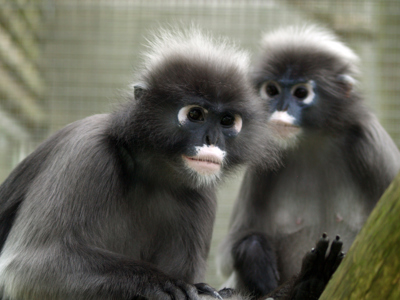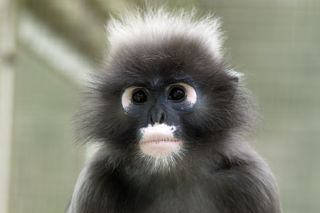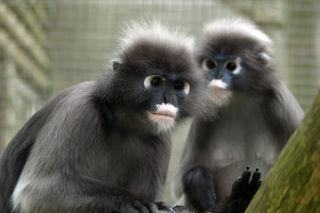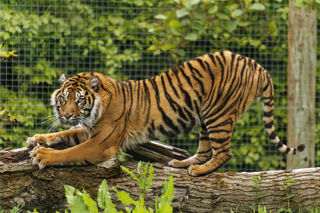
Dusky Langur
Dusky langurs are known as spectacled leaf monkeys because the light patches around their eyes resemble a pair of glasses. They are native to Malaysia, southern Myanmar and southwestern Thailand, and favour a diet of young leaves, shoots, fruits and seedlings, and source their food from up to 87 different species of plant.
These social, playful primates are agile, and easily adapt to a variety of environments. Dusky langurs are diurnal, meaning they’re most active during the daytime, and travel in groups of between 5-20 individuals throughout the forest canopy. They’re endangered in the wild because they face threats such as hunting and habitat loss.

What is special about the dusky langur?
Dusky langur colouration is affected by the amount of sunlight an individual is exposed to.
Dusky langurs normally eat one quarter of their body weight in food per day, eating predominantly leaves sourced from high in the forest canopy (and fruits when seasonally available).
Dusky langurs are born with a bright orange fur which darkens as they age. It is thought that this protects the young whilst they’re vulnerable, as many predators can’t visually perceive the colour orange.

Did you know?
Dusky langurs live in groups called ‘troops’, and break off into smaller groups to forage for food
Dusky langurs live in complex social troops and communicate with other members using twelve unique vocalisations which can sound like snorts, squeaks, murmurs or hoots depending on what they are communicating. Calls from some species of langur can even be heard from over 100m away.
As seed-eating herbivores (animals that only eat plants), dusky langurs are excellent seed dispersers, spreading seeds throughout their forest habitats. Dusky langurs are special because they can swallow seeds whole and they remain undamaged after passing through their digestive systems. After travelling throughout the forest, dusky langurs will poo the seeds in a new location, spreading species of trees to new locations and maintaining the diversity of their tropical forest habitats.
Key Facts:
Scientific name: Trachpithecus obscurus
Range: Malaysia, Myanmar, Thailand
Habitat: Closed primary and secondary forests, plantations, urban areas and parks (highly adaptive)
Diet: Herbivore and folivore (eats only plants and mainly foliage) - leaves, seeds, fruits and flowers
IUCN Red List: Endangered

What are we doing to protect dusky langurs?
Twycross Zoo is one of only three organisations in the UK and one of five in Europe to house a troop of dusky langurs.
The Twycross Zoo team work with a variety of conservation partners around the world. In south-east Asia, we work with the Borneo Nature Foundation and Fauna & Flora, who are working hard to protect the habitats in which the dusky langur lives. .

SUPPORT OUR ANIMALS
If you're looking for an alternative way to donate to Twycross Zoo, you can help support our animals and our zoo keepers by purchasing something from our Amazon Wishlist!
Updated regularly by our zoo keepers, the items on the list help to provide enrichment for our animals and keep their habitats well maintained.
Every donation helps us as a conservation charity.
